Key takeaways:
- AI transforms customer connections through advanced analytics and personalized marketing strategies.
- Key benefits of AI marketing include personalization at scale, improved efficiency, predictive analytics, and enhanced customer experience.
- Popular AI tools such as HubSpot, ChatGPT, and Google Analytics enhance data analysis and content creation while enabling informed decision-making.
- Future trends in AI marketing focus on hyper-personalization, integration with emerging technologies like AR, and addressing ethical considerations regarding data privacy.
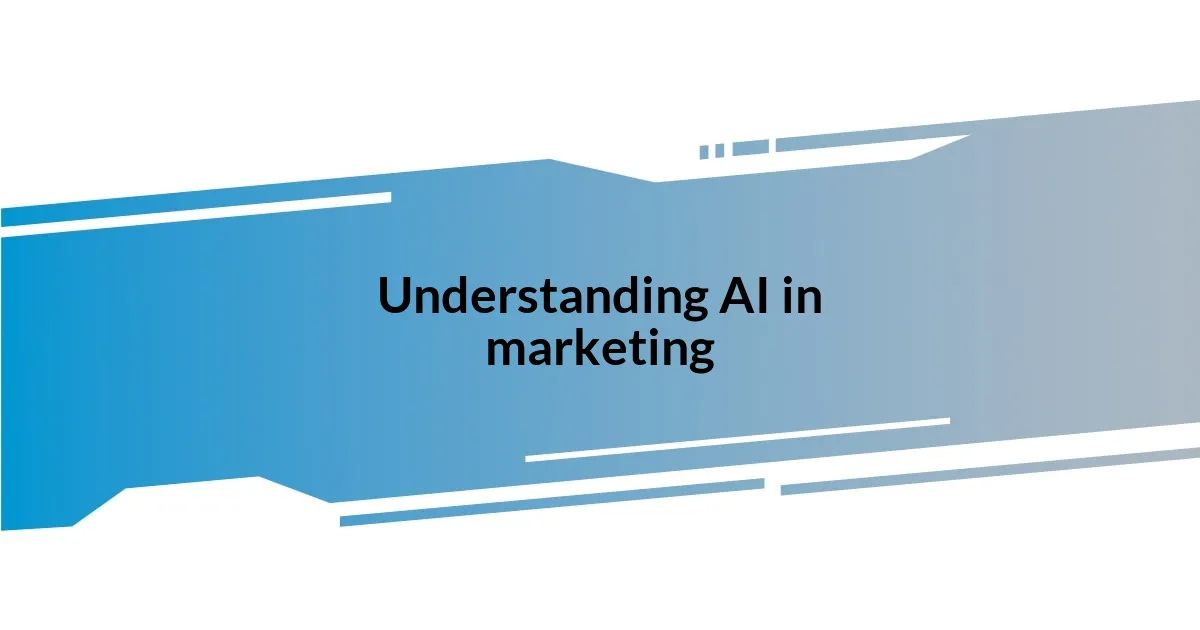
Understanding AI in marketing
AI in marketing isn’t just a buzzword; it transforms how we connect with customers. I remember when I first delved into AI analytics, it was like flipping a light switch. Suddenly, I could see patterns in consumer behavior that I’d missed before, sparking a deep sense of curiosity about what more AI could unveil.
One of the fascinating aspects I’ve encountered is how AI tailors marketing efforts to individual preferences. Have you ever opened an app and felt as if it knew precisely what you wanted? That’s not magic; it’s AI. When I witnessed firsthand how personalized recommendations drove engagement, it left me wondering about the endless possibilities of creating deeper customer connections.
Moreover, AI automates repetitive tasks, allowing marketers to focus on strategy and creativity. I often find myself reflecting on how much time I’ve saved through automation tools, which frees up mental energy for brainstorming innovative campaigns. Doesn’t it feel empowering to envision a future where technology handles the mundane, leaving us to foster real human relationships?
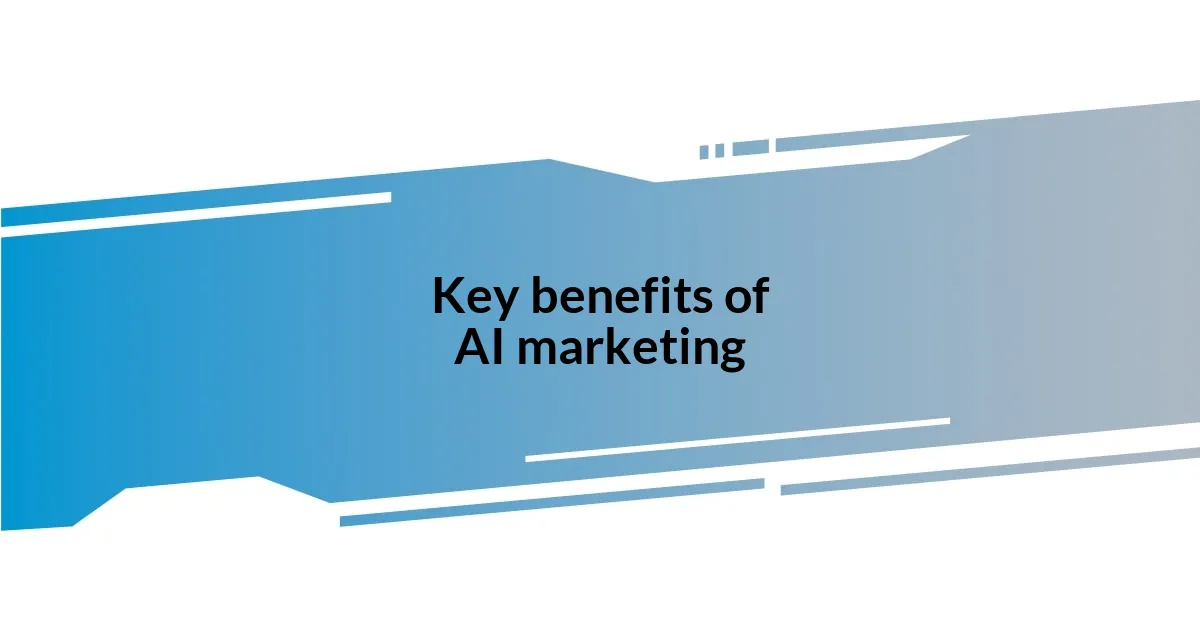
Key benefits of AI marketing
AI marketing offers a treasure trove of benefits that can significantly enhance a brand’s strategy. One major advantage I’ve noticed is the capacity for advanced data analysis. With AI, it’s not just crunching numbers; it reveals insights I wouldn’t have considered, such as customer sentiment trends. I remember a campaign I worked on where we adapted our messaging based on AI-generated consumer insights, leading to a noticeable uptick in response rates.
Here are some key benefits of AI marketing:
- Personalization at Scale: AI enables tailored content that meets individual preferences.
- Improved Efficiency: Automation of tedious tasks allows teams to allocate resources better, focusing on creative strategies.
- Predictive Analytics: The ability to forecast trends helps in making informed decisions quickly.
- Enhanced Customer Experience: AI tools, like chatbots, provide timely responses, improving customer satisfaction.
- Cost-effectiveness: While initial investments can seem high, the long-term savings on manpower and increased ROI are often significant.
Reflecting on my experiences, I often recall how a predictive model helped us invest in the right channels, ultimately pulling us ahead of the competition. It felt satisfying to be rewarded for embracing such innovative technology!
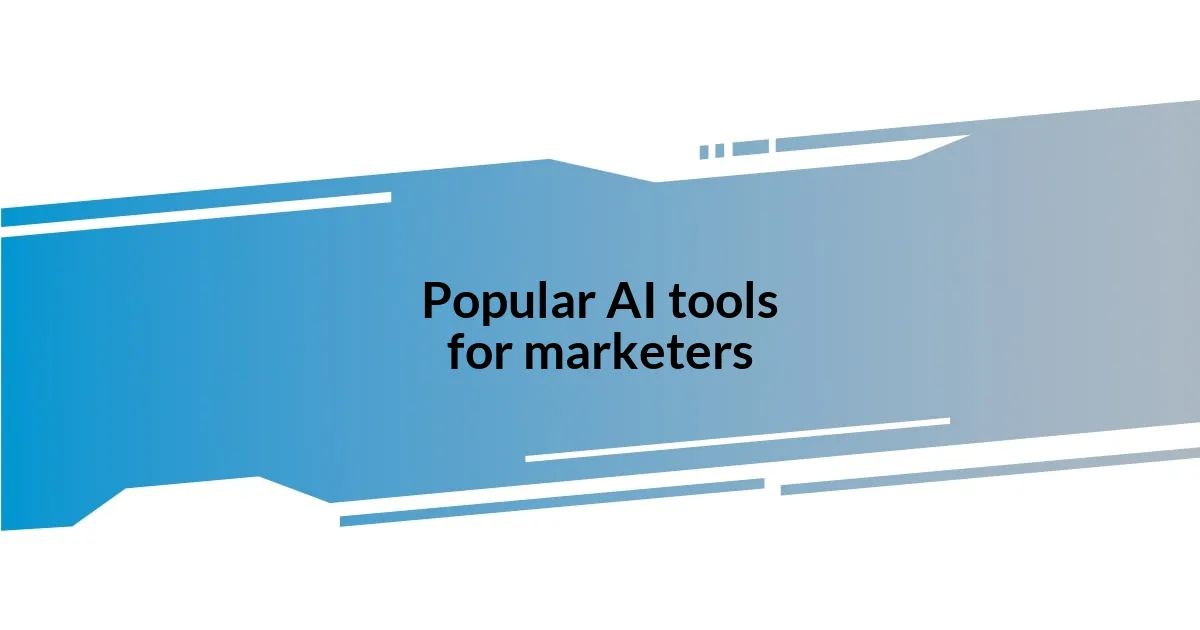
Popular AI tools for marketers
When I think about popular AI tools for marketers, a few stand out as truly exceptional. Tools like HubSpot and Marketo not only streamline marketing efforts but also empower data-driven decision-making. I still remember the first time I integrated HubSpot into my workflow; the dashboard was a revelation, offering insights I could access at a glance. Isn’t it amazing how a well-designed tool can transform an abstract concept into actionable strategies?
Then there are AI-driven tools like ChatGPT and Jasper that revolutionize content creation. These platforms analyze trends and generate engaging copy in seconds. I was skeptical at first—after all, how could a machine understand nuances? But when I tested these tools, I was blown away by their ability to mimic human-like writing styles, which significantly sped up our content pipeline. Have you ever wished for an extra pair of hands while juggling multiple projects? That’s precisely the support these tools provide.
Lastly, don’t overlook the power of data analytics tools such as Google Analytics with AI enhancements. With real-time insights, I’ve been able to pivot strategies almost instantly based on consumer behavior. I remember analyzing a recent campaign’s performance and finding unexpected peak times for audience engagement. It was a bit like unveiling a hidden treasure, giving me the upper hand in optimizing future campaigns!
| Tool | Key Features |
|---|---|
| HubSpot | CRM, email marketing, automation, analytics |
| Marketo | Lead management, analytics, personalized content |
| ChatGPT | Content generation, conversational AI |
| Jasper | AI writing assistant, SEO optimization |
| Google Analytics | Data tracking, audience insights, real-time reporting |
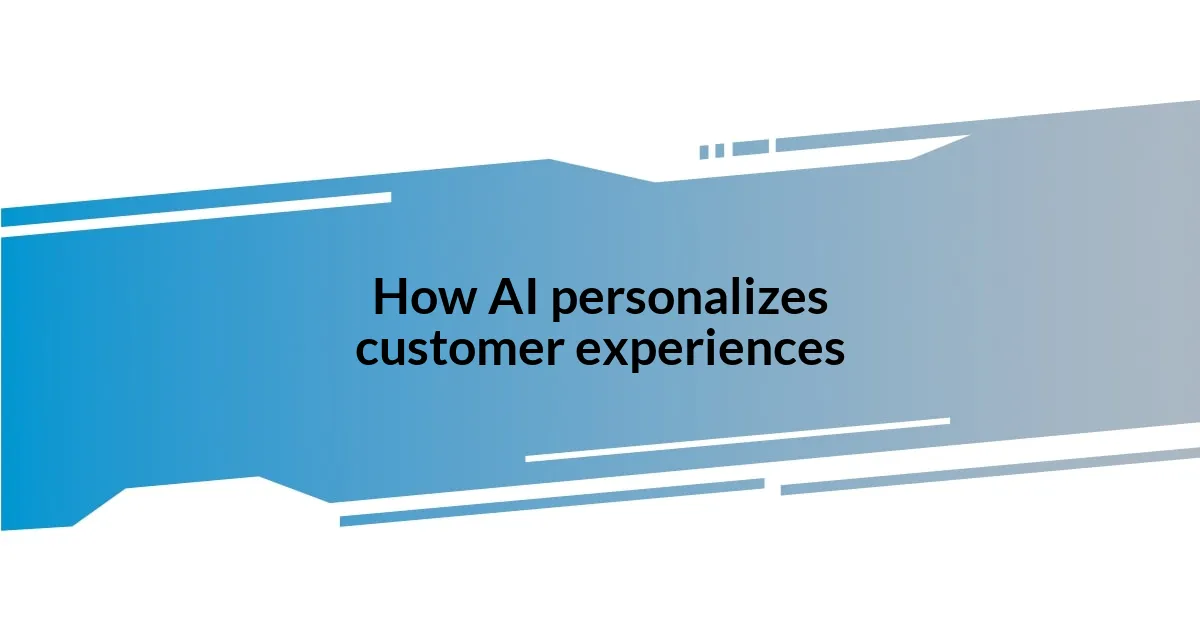
How AI personalizes customer experiences
One of the most striking ways AI personalizes customer experiences is through the use of advanced algorithms that analyze user data. I remember a time when we implemented an AI recommendation engine in our e-commerce platform. Suddenly, we had insights into customer preferences that were so nuanced; it felt like we had a direct line into their minds. Isn’t it fascinating how a simple suggestion can lead a hesitant shopper to complete a purchase?
Moreover, AI-driven tools can create personalized communication, enhancing engagement significantly. I’ve seen firsthand how tailoring emails based on individual behavior dramatically increases open rates. Thinking back on a campaign, we adjusted our messaging based on past purchases and browsing history, and the transformation was palpable. Can you imagine the impact of receiving recommendations that truly resonate with your interests? It’s like having a personal shopper who knows your taste!
In addition, chatbots powered by AI provide real-time, personalized customer support. One day, while testing a chatbot for a client’s website, I was astounded by its ability to handle inquiries with such nuance and efficiency. Customers felt heard and valued, reducing frustration and abandonment rates. I pondered: how many times have we all wished for immediate answers? With AI, that wish is becoming a reality, creating a seamless experience for customers.
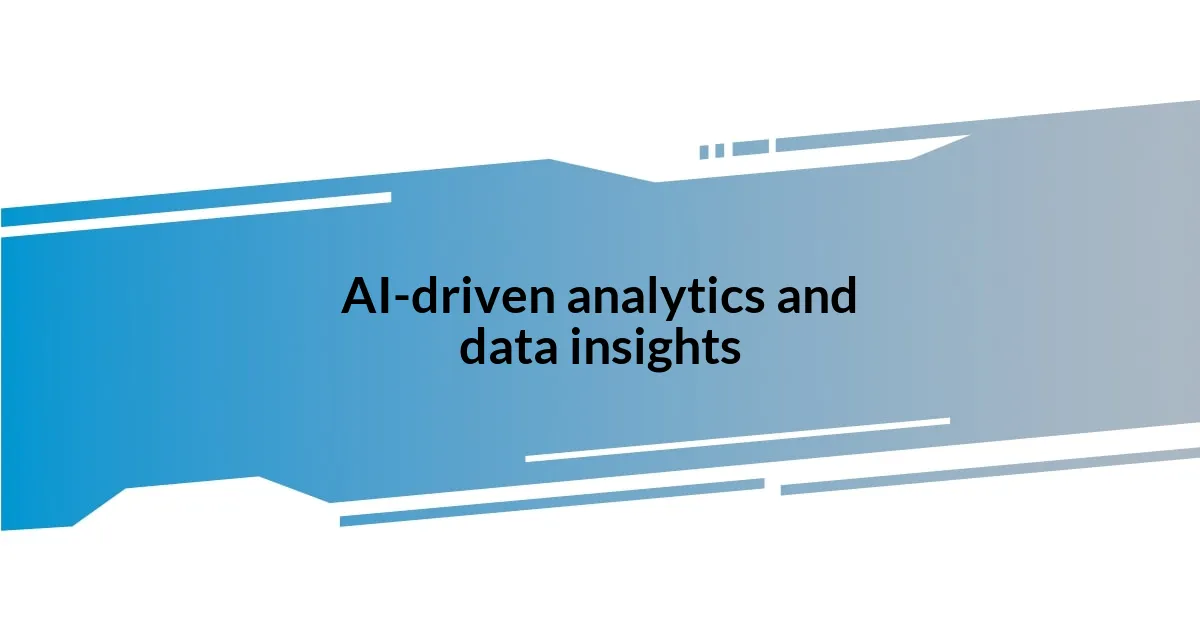
AI-driven analytics and data insights
Analyzing data through AI-driven tools has been a game-changer for me. For example, when I first started using AI analytics platforms, I was amazed by how quickly they could sift through vast amounts of data to identify trends. It felt like having a smart detective on my team, uncovering patterns I had overlooked. Have you ever found yourself buried under spreadsheets, wishing someone could do the heavy lifting? That’s exactly what these tools offer!
One time, while working on a project, I noticed how an AI-driven insight revealed consumer behavior that was incredibly specific—like which social media posts sparked the most engagement. It was almost eerie but in a good way! This allowed us to tailor our strategy effectively, leading to an unexpected increase in conversions. Isn’t it incredible how machine learning can unveil insights that might take a human hours or even days to decipher?
Furthermore, the predictive capabilities of AI analytics are something I can’t ignore. On one occasion, I used an AI tool that accurately predicted a seasonal spike in demand for one of our products. Anticipating this shift felt like preparing for a storm—I was ready and equipped, which made all the difference. How often do you rely on gut feelings when making decisions? With AI, I’ve learned to trust the data, blending intuition with hard evidence for more strategic outcomes.
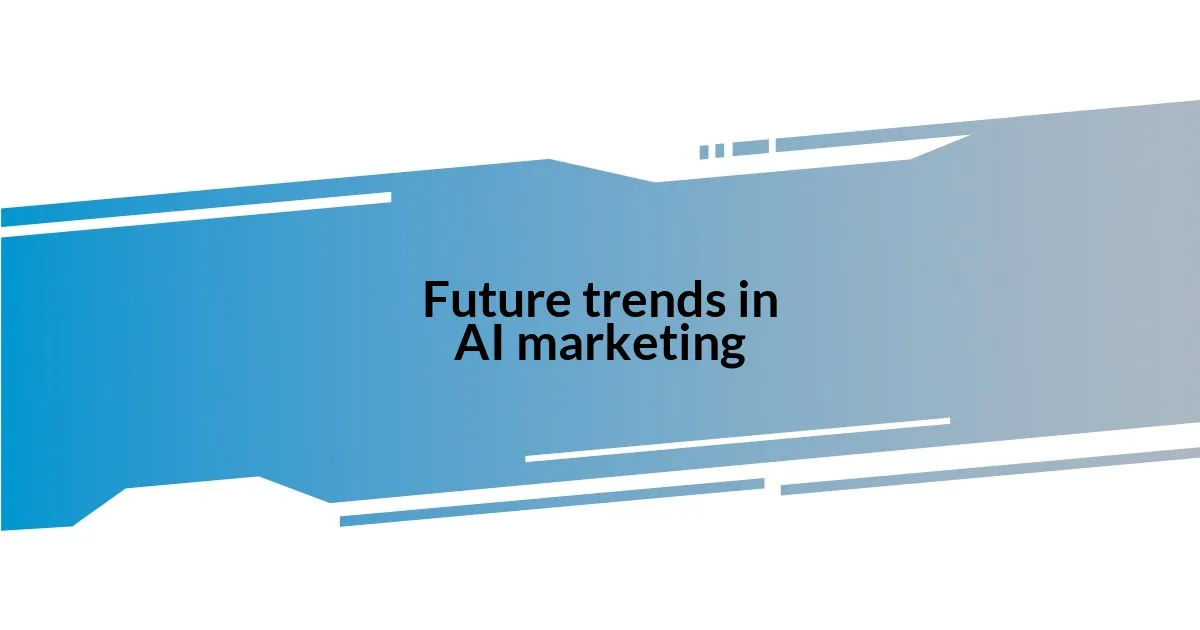
Future trends in AI marketing
The landscape of AI marketing is evolving rapidly, and I see a significant shift towards hyper-personalization. I vividly recall a recent brainstorming session where we discussed leveraging AI to not only analyze past behaviors but also predict future preferences in real-time. It was such an exciting idea—imagine a world where customers receive content that feels as if it had been crafted just for them in that moment. Doesn’t it make you wonder how this level of personalization could redefine customer loyalty?
Another trend I’m observing is the integration of AI with emerging technologies, like augmented reality (AR). During a project where we experimented with AR in marketing campaigns, I found it thrilling to see how AI could enhance user experiences by overlaying personalized content in real-time. Think about it: customers can visualize products in their own space before making a purchase. How cool is that? This convergence not only draws customers in but also provides a richer, more immersive shopping experience.
Moreover, the ethical considerations surrounding AI in marketing are becoming increasingly important. I often reflect on a webinar I attended where experts discussed the implications of data privacy. There’s a real challenge here: how do we harness powerful AI tools without crossing ethical boundaries? It’s a meaningful dialogue that all marketers should engage in, considering that the future will not just be about what we can do with AI, but also about how responsibly we can use it. What are your thoughts on finding that balance?